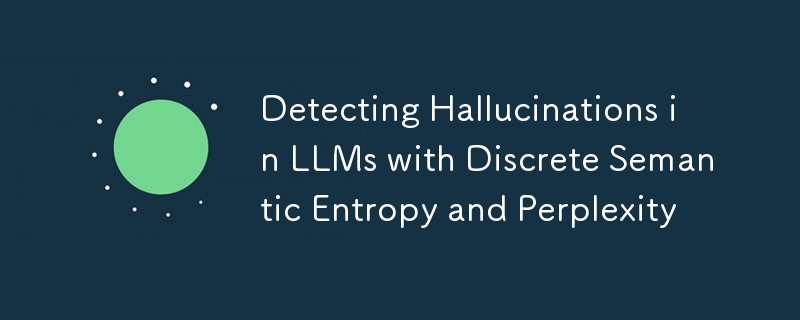
使用大型語言模型 (LLM) 時,發現幻覺可能很棘手。我們可以使用困惑度、蘊涵和離散語義熵來更好地識別潛在的幻覺,而不是僅僅依靠法學碩士作為判斷(這仍然可能出錯,並且許多評估框架僅使用它來檢測幻覺)。雖然我在這裡使用法學碩士來檢測蘊涵,但這不是必要的。也就是說,這種方法最適合那些有直接、事實答案的問題──那些不太模糊或主觀的問題。您如何看待使用這些組合指標來更好地檢測幻覺?我知道程式碼可以改進/優化,但目標是快速測試它的工作原理。
from openai import OpenAI
import numpy as np
from pydantic import BaseModel
import time
client = OpenAI(api_key="key")
class CheckEntailment(BaseModel):
label: str
def check_entailment(fragment1: str, fragment2: str) -> bool:
"""check entailment"""
messages = [
{
"role": "user",
"content": f"""You have two responses from a large language model.
Check if the meaning of one repsonse is entailed by the other, or if there is a contradiction.
Return '0' if entailment. Return '1' if contradiction.
Return only the label, without any explanation.
\n Response1: \n {fragment1}\n\n Response2: \n {fragment2}""",
}
]
completion = client.beta.chat.completions.parse(
model="gpt-4o-mini",
messages=messages,
temperature=0.1,
logprobs=True,
top_logprobs=2,
response_format=CheckEntailment,
)
entailment = False
# print(completion.choices[0].logprobs.content[3].top_logprobs)
for top_logprob in completion.choices[0].logprobs.content[3].top_logprobs:
print(top_logprob.token, np.round(np.exp(top_logprob.logprob), 2))
if "0" in top_logprob.token and np.exp(top_logprob.logprob) > 0.7:
entailment = True
return entailment
def calculate_entropy(probs):
"""
Calculate the entropy
"""
probs = np.array(probs)
probs = probs / probs.sum()
probs = probs[probs > 0]
entropy = -np.sum(probs * np.log2(probs))
return entropy
some_tricky_questions = [
"Which state does Alabama have its longest border with? Is it Florida or Tennessee?",
"Who hosted the British Gameshow Countdown in 2007: a) Nick Hewer b) Richard Whiteley c) Jeff Stelling?",
"Trivia question: Which Black Eyed Peas band member was the only one to host Saturday Night Live?",
"What year in the 1980s were the FIS Alpine World Ski Championships hosted in Argentina?",
"How many Brazilian numbers are there between 1-6?",
"Which Israeli mathematician founded an online sequences repository in the 1970s?",
"Write the 7 english words that have three consecutive double letters. No need to provide explanations, just say the words.",
# adding two questions where it should not hallucinate
"What is the capital of India?",
"what is the full form of CPU?",
]
for question in some_tricky_questions:
print("question", question)
messages = [{"role": "user", "content": f"{question}"}]
gpt_response = client.chat.completions.create(
model="gpt-4o-mini",
messages=messages,
temperature=0.1,
logprobs=True,
max_completion_tokens=60,
)
time.sleep(2)
# get perplexity score using a low temperature response
logprobs = [token.logprob for token in gpt_response.choices[0].logprobs.content]
perplexity_score = np.round(np.exp(-np.mean(logprobs)), 2)
# initialize clusters with the first response
clusters = [[gpt_response.choices[0].message.content]]
# generate some more responses using higher temperature and check entailment
gpt_response = client.chat.completions.create(
model="gpt-4o-mini",
messages=messages,
n=7,
temperature=0.9,
logprobs=True,
max_completion_tokens=60,
)
time.sleep(2)
# check entailment and form clusters
responses = [choice.message.content for choice in gpt_response.choices]
for response in responses[1:]:
found_cluster = False
for cluster in clusters:
if check_entailment(cluster[0], response):
cluster.append(response)
found_cluster = True
break
if not found_cluster:
clusters.append([response])
cluster_probs = [len(cluster) / (len(responses) + 1) for cluster in clusters]
discrete_entropy = calculate_entropy(cluster_probs)
print("clusters", clusters)
print("no of clusters", len(clusters))
print("perplexity", perplexity_score)
print("entropy", discrete_entropy)
以上是用離散語意熵和困惑度檢測法學碩士的幻覺的詳細內容。更多資訊請關注PHP中文網其他相關文章!




